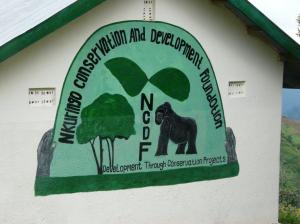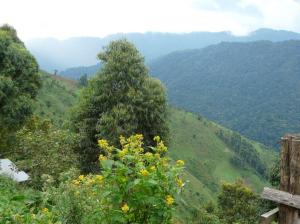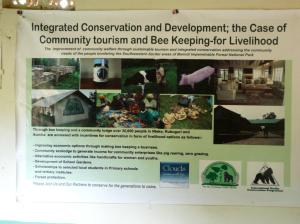I really don’t know where I come down on this issue. On one hand, you have a monopoly over six of 48 gorilla permits on offer in Uganda each day. On the other hand, you have a creative public/private partnership that is giving far more financial benefit to a couple of communities than pretty much any other tourism initiative I have seen here in Uganda.
Nkuringo is a community on the border of Bwindi Impenetrable National Park, the home of about half of the world’s remaining highly endangered mountain gorillas. As in so many communities around the parks here, the people living in Nkuringo were having trouble with wildlife coming out of the forest and damaging their crops. This tends to lead to people killing wildlife to protect their food source. People in these boundary communities also tend to see many tourists driving past their homes in nice vehicles, but receive very little financial benefit from this tourism.
To address these issues, in 2004 the International Gorilla Conservation Foundation and the Uganda
Wildlife Authority set up the Nkuringo Community Development Foundation to represent Nkuringo and Rubugiri parishes, bordering a section of Bwindi Impenetrable National Park. They were given control of a large piece of land and right of first refusal on 6 of the 8 mountain gorilla tracking permits available each day for the family of gorillas that has been habituated in the area (not all 8, as the articles below claim).
The community group was having trouble marketing the permits, so they joined in a partnership with The Uganda Safari Company. IGCP solicited $250,000 from USAID to build a lodge in Nkuringo, and The Uganda Safari Company matched that initial investment (and have apparently put in much more subsequently). The result was the beautiful (and pricey) Clouds Lodge, opened in 2008. Permits and lodging tend to be sold in packages, so people tracking this particular family of gorillas are likely to stay at Clouds.
This raised the ire of many of the other tour operators in the country. There are peak seasons in the year when permits need to be booked months in advance, and it is a definite advantage to any company to have a guaranteed six permits per day to offer their clients. The complaints of these other tour operators led to an investigation by the Inspector General of Government, Raphael Baku. The resulting report was a pretty strong condemnation of the arrangement and an order to cancel the contract.
However, I have heard that the IGG report was riddled with inconsistencies and errors, and certainly there are some problems even with the information that has made it out into the news. One of the articles states:
The NCDF, a company limited by shares, gets eight permits each day and purports to represent entire communities of Rubuguri and Nteko parishes neighbouring Bwindi Impenetrable Forest yet it is owned by only 23 people, the IGG wrote.
In fact, NCDF is not a company at all, but a registered NGO. They have a Board of Directors consisting of 39 members, and a general assembly of 271 representing the villages in the parishes.
Another article stated:
Investigations by the IGG office indicated that UWA encouraged individuals to form a private company with which they operated private businesses in respect to gorilla permit tourism, edging out others.
Once again, they are either referring to NCDF, which is not a private company, or The Uganda Safari Company, which was in operation for years before it got involved with this arrangement.
One way or another, there is a lot of misinformation out there, and I think it is not unlikely that the IGG will reverse its decision.
I recognize that from a strictly business perspective, it is unfair to give an advantage to one company by offering them right of first refusal for 75% of the permits available in Nkuringo, and I’m sure some of my friends in the tourism industry here will stop talking to me for a while for even suggesting otherwise.
But here’s the thing…in 2009, the NCDF, a community-based organization representing two boundary parishes, received $40,000 through this arrangement. That’s a lot of money. For every single person who stays at Clouds Lodge, $35 goes to NCDF whether the lodge is turning a profit or not. They also receive rent from the land the lodge sits on. I am not aware of any other tourism arrangement in Uganda that funnels so much money directly into local communities (although it is possible that the Buhoma Homestead, fully owned and operated by the Buhoma community, is bringing in that much or more).
I am not making a naïve assumption that the arrangement is perfect. Corruption is the norm here, and who knows how much of that money actually got where it was supposed to go. I also don’t like the fact that the community group receives the money whether or not they do anything, reinforcing the handout mentality that plagues a lot of projects here.
It’s a tricky issue. Uganda needs business development, and tour operators are fueling a growing percentage of the economy here. There needs to be a supportive business environment to encourage them to expand. However, most tourism here doesn’t really benefit local communities all that much. When you have an alternative tourism arrangement that seems unfair to some tour operators, but has the potential to reduce poverty in communities around Bwindi, how do you define fair?
Mark D. Jordahl – Kampala
More info:
Uganda Wildlife Authority’s Statement
http://www.newvision.co.ug/D/8/220/720510 New Vision Article
http://www.monitor.co.ug/News/National/-/688334/922650/-/item/0/-/u1qp5wz/-/index.html The Monitor Article









IGCP had been working in this area for a while. The problem of gorillas coming out onto people’s land was real and this is why some of them opted to sell their land which now forms some sort of buffer with the park. An arrangement that would take direct benefits to the affected communities was needed urgently. This is where this arrangement came in. It was designed in good faith and was not intended to hurt anyone. Obviously some people were hurt but one has to look at previous attempts to return benefits to PA adjacent communities who pay the opportunity cost for living near such places; most have not been very successful. One could argue with the total amounts going to the community as opposed to total receipts but one has to remember that this is a business concern (not a missionary outfit). I think the way forward is to empower communities to be able to bargain for more, within the legal framework. It should be a partnership between UWA, the local people and the private operator. Partners always discuss how to enhance their partnership. All in all, I think it is a good innovation which needs to be given a chance! Many people do not like such innovations especially when benefits are going to local people!
Panta
Thanks for your input, Panta!
Mark D. Jordahl Conservation Concepts 256 775 295 126 Blog: https://conserveuganda.wordpress.com Website: http://www.ConservationConcepts.net
“Give me a Wildness whose glance no civilization can endure.” – Henry David Thoreau
Thanks for your comments, Wolfgang. I am glad that you brought out the fact that the opportunity did go out to public bid – that would have been a good thing for me to include in the entry.
As always, I appreciate your perspective and experience here.
Regards,
Mark
Thanks for the factual explanation … the complainants were several, I would not call it many and for sure not a majority (especially not in private discussions), and they are a vocal minority driven by greed and envy, who missed the proverbial boat when in 2003/4 the African Wildlife Foundation office in Kampala advertised for expressions of interest towards the Nkuringo project. Many companies applied, a lot of rubbish proposals were of course put instantly on to the heap ‘not worth it’ and after a long and careful consideration did TUSC win the tender.
I maintain that this in an exemplary cooperation, and that USAID and the AWF would neither have supported the project nor put that much money into it, had they not been totally convinced that this is a good deal, for the community of Nkuringo – now the envy of many other parishes in the wider area – and for conservation of the mountain gorillas.
In ending, those who have launched all these complaints have in all earnest, probably inflamed by the fact that I did not support their outrageous complaints, suggested that I was in the pocket of TUSC and have been ‘bought’ – a laughable suggestion which I treat with the contempt it deserves.
Very sincerely
Wolfgang
[…] The Permit Wars « Wild Thoughts from Uganda […]
[…] The Permit Wars « Wild Thoughts from Uganda Why did the US military permit so much drug use among soldiers …FiveOClockNews.net » Blog Archive » Ways of procuring UK Work PermitAppeals court upholds hybrid energy center's air permit | TriCitiesLatte Republic: Permit Extensions Promote Private Development …RESTREPO Theater Dates « threedonia.comGingrich: American hungry for change, conservative solutions …When Considering Theater Tickets And How To Obtain Them OnlineFootball and cold weather | Arkansas NewsPentagon Contractor Profits Rise – Along With Casualties …New climate change reports underscore need for action – Jonathan … View the Contact Powered by Staff […]